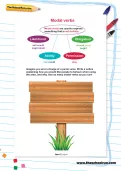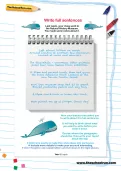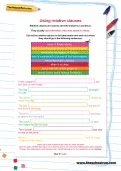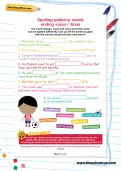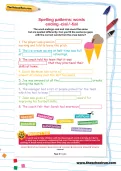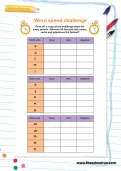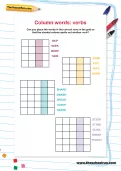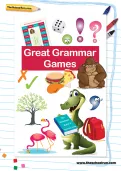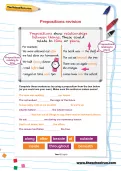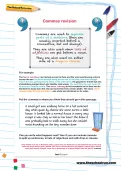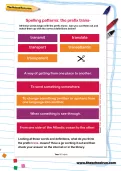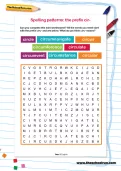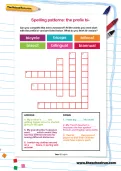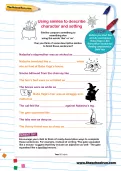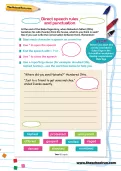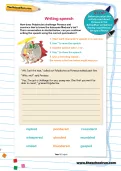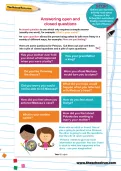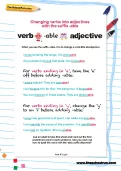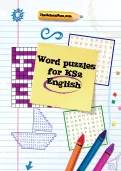Relative clauses are used to add information to a sentence. They usually start with when, who, that, which or whose. In this teacher-created worksheet for primary school children, you will need to cut out the relative clauses in the table and work out where they should go in the sentences.
or
Register to add to your saved resources
The word endings -cious and -tious sound the same but are spelled differently. Can you fill the sentence gaps with the correct words from the ones below?
or
Register to add to your saved resources
Already a subscriber? to view this content.
The word endings -cial and -tial sound the same but are spelled differently. Can you fill the sentence gaps with the correct words from the ones below?
or
Register to add to your saved resources
Already a subscriber? to view this content.
Adverbs are used to make writing more interesting. They explain how something is being done. Can you improve this passage by adding adverbs?
or
Register to add to your saved resources
Already a subscriber? to view this content.
Print off a copy of the challenge sheet for every person. Who can fill the grid with nouns, verbs and adjectives the fastest?
or
Register to add to your saved resources
Already a subscriber? to view this content.
Can you place the words in the correct rows in the grid so that the shaded column spells out another verb?
or
Register to add to your saved resources
From proper nouns to pronouns, statements to subordinate clauses and articles to adverbs, help your child revise grammar the fun way with our Great Grammar Games learning pack. A friendly, grammar- and flamingo-obsessed Grammar Gator offers tips, tricks, exercises and activities to help your child practise all aspects of basic English grammar in play-packed sessions.
or
Register to add to your saved resources
Already a subscriber? to view this content.
Prepositions show relationships between things. These could relate to time or place. Complete these sentences by using a preposition from the box below (or you could use your own). Make sure the sentence makes sense!
or
Register to add to your saved resources
Already a subscriber? to view this content.
Modal verbs are used to express something that is not definite. Imagine you are in charge of a picnic area. Write a notice explaining how you would like people to behave when using
the area, and why. Use as many modal verbs as you can!
or
Register to add to your saved resources
A useful commas worksheet for KS2 children, created by an experienced educator.
Commas are used to separate parts of a sentence (they are usually inserted before a connective, but not always). They are also used when lists of adjectives are put before a noun. They are also used on either side of a drop-in clause. Put the commas in where you think they should go in this passage.
or
Register to add to your saved resources
Already a subscriber? to view this content.
All these words begin with the prefix trans-. Can you cut them out and match them up with the correct definitions below? Looking at these words and definitions, what do you think the prefix trans- means? Have a go working it out and then check your answer on the internet or in the library
or
Register to add to your saved resources
Already a subscriber? to view this content.
All these words begin with the prefix tele-. Can you cut them out and match them up with the correct definitions below?
or
Register to add to your saved resources
Already a subscriber? to view this content.
Can you complete this mini-wordsearch? All the words you need start with the prefix circ- and are below. What do you think circ- means?
or
Register to add to your saved resources
Can you complete this mini-crossword? All the words you need start with the prefix bi- and are listed below. What do you think bi- means?
or
Register to add to your saved resources
Already a subscriber? to view this content.
A KS2 English worksheet created by a teacher to help your child practise using similes to describe character and setting.
or
Register to add to your saved resources
A KS2 grammar worksheet created by a teacher to help your child use direct speech and punctuation correctly. Includes examples and definition.
or
Register to add to your saved resources
Already a subscriber? to view this content.
How does Polydectes challenge Perseus and convince him to brave the fearsome Medusa’s lair? Their conversation is started below; can you continue writing the speech using the correct punctuation?
or
Register to add to your saved resources
Already a subscriber? to view this content.
A closed question is one which only requires a simple answer (usually one word), for example: What is your name? An open question allows the person being asked to talk more freely in a variety of different ways, for example: How are you feeling? Here are some questions for Perseus. Cut them out and sort them into a pile of closed questions and a pile of open questions.
or
Register to add to your saved resources
Already a subscriber? to view this content.
When you use the suffix -able, it is to change a verb into an adjective. For verbs ending in ‘e’, take the ‘e’ off before adding -able. For verbs ending in ‘y’, change the ‘y’ to an ‘i’ before adding -able. Can you spell these words with the -able suffix attached?
or
Register to add to your saved resources
Already a subscriber? to view this content.
Are you and your child tired of the same old English revision and practice sessions? Try something completely new and give them these fun English word puzzles instead! They'll review everything from connectives to apostrophes, using what they learn in class to solve codes, crosswords and wordsearches.
or
Register to add to your saved resources
Already a subscriber? to view this content.
